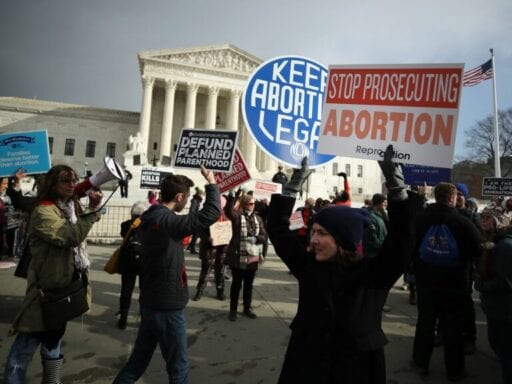The case could still lead to the end of Roe v. Wade.
The Supreme Court issued a stay on Thursday blocking enforcement of a Louisiana abortion law. The case could have implications for abortion rights nationwide.
June Medical Services v. Gee concerns a 2014 Louisiana law requiring abortion providers to have admitting privileges at a local hospital. Abortion rights advocates have long argued that such laws are medically unnecessary and are simply an effort to shut down abortion clinics. In the 2016 case Whole Woman’s Health v. Hellerstedt, the Supreme Court ruled that an admitting privileges law in Texas was unconstitutional.
The Center for Reproductive Rights challenged the Louisiana law on behalf of abortion providers, and in September 2018, the Fifth Circuit Court of Appeals allowed the law to stand, breaking with Supreme Court precedent. The plaintiffs appealed to the Supreme Court, and asked for a stay of the law, which was supposed to go into effect February 4. Last week, Justice Samuel Alito issued an order blocking the law until this Thursday.
The ruling on Thursday blocks enforcement of the law while the court considers whether to hear the case. If the court does hear June Medical Services v. Gee, it could be a chance for the justices to revisit and possibly overturn Roe v. Wade, something advocates on both sides of the issue see as more likely since the confirmation of Justice Brett Kavanaugh. So while abortion rights advocates welcomed the Supreme Court’s decision Thursday, the story of the Louisiana law — and its potential impact on the rest of the country — is far from over.
The Court ruled 5-4 to block the Louisiana law
The Supreme Court ruled 5 to 4 to block enforcement of the Louisiana law, with Chief Justice John G. Roberts Jr. joining the court’s four more liberal members, according to the Washington Post. Justices Alito, Kavanaugh, Clarence Thomas, and Neil Gorsuch voted to allow the law to go into effect.
The ruling was a victory for abortion-rights advocates, albeit a temporary one. “The Supreme Court has stepped in under the wire to protect the rights of Louisiana women,” said Nancy Northup, president and CEO of the Center for Reproductive Rights, in a statement to media outlets. “The three clinics left in Louisiana can stay open while we ask the Supreme Court to hear our case.”
Laws requiring admitting privileges — which allow abortion providers to go to local hospitals and treat their patients there — have proliferated around the country in recent years. Abortion opponents have argued that these laws are necessary to protect women’s health, but courts have generally failed to find evidence for this — abortion is generally a very safe procedure for the patients who undergo it, and they typically don’t need to be admitted to a hospital.
Moreover, abortion providers don’t need to have admitting privileges for their patients to visit a hospital. As Judge Richard Posner of the Seventh Circuit Court of Appeals wrote in an opinion striking down a Wisconsin admitting privileges law, “A woman who experiences complications from an abortion (either while still at the clinic where the abortion was performed or at home afterward) will go to the nearest hospital, which will treat her regardless of whether her abortion doctor has admitting privileges.”
Meanwhile, the laws have resulted in abortion clinic closures, since it’s often difficult for abortion providers to get hospital admitting privileges.
That’s a concern for opponents of the Louisiana law, which, according to Travis Tu, lead counsel on the case for the Center for Reproductive Rights, would turn Louisiana into “an abortion desert.” It would close at least two of the three remaining clinics in Louisiana, a state with one million women of reproductive age, Tu said.
In Whole Woman’s Health, the Supreme Court ruled that a Texas admitting privileges law was unconstitutional, finding that it “provides few, if any, health benefits for women, poses a substantial obstacle to women seeking abortions, and constitutes an ‘undue burden’ on their constitutional right to do so.”
The Louisiana law is nearly identical to the Texas law, but in September, the Fifth Circuit upheld the Louisiana version, essentially placing itself in direct conflict with the Supreme Court. The Center for Reproductive Rights appealed, asking the Supreme Court to hear the case.
Now that the court has stopped enforcement of the law, it must decide whether to hear the appeal. If it decides not to take the case, the stay issued on Thursday would end automatically and the law would go into effect.
If the court does decide to take the case, it will have to decide whether to follow the precedent set in Whole Woman’s Health, striking down the Louisiana law, or reverse itself and uphold the law. In the process, it could decide to overturn the protection for abortion rights set forth in Roe v. Wade.
Whole Woman’s Health was decided when Justice Anthony Kennedy, typically seen as a moderate, was still on the court. Now he’s been replaced by Kavanaugh — who, while he refused to directly answer questions about Roe during his confirmation hearing, is seen by advocates on both sides as a potential deciding vote to overturn the landmark abortion decision.
Kavanaugh issued an opinion dissenting from Thursday’s decision to issue the stay. He argued that the Louisiana law should be allowed to take effect to allow abortion providers to determine if they could, in fact, obtain admitting privileges. Then, if they could not, he said, they could file another challenge to the law.
“In order to resolve the factual uncertainties presented in the stay application about the three doctors’ ability to obtain admitting privileges, I would deny the stay,” he wrote.
If the court agrees to hear June Medical Services v. Gee, advocates on both sides will be watching Kavanaugh closely, as the future of abortion law in America may be at stake.
Author: Anna North
Read More



